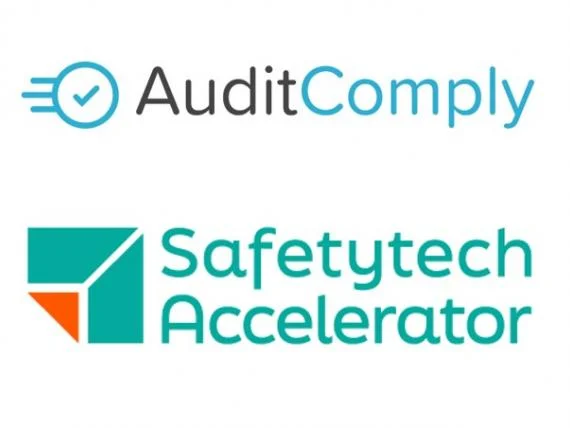


The winner of Discovering Safety’s third Safetytech Challenge, run by Safetytech Accelerator, has shown how shortcuts are linked to many accidents that take place on site. Belfast-based company AuditComply has pointed the way towards better, evidence-based management of common safety risks, by digging into safety data held by the Health and Safety Executive (HSE) and actual Risk Assessment Method Statements (RAMS) used by construction industry partner Costain PLC.
AuditComply worked on a three-month pilot exploring how shortcuts in the workplace can undermine companies’ best efforts to run a compliant and safe worksite.
The theme of this year’s Safetytech Challenge was to explore the risks from taking shortcuts on a worksite – and how they can undermine compliance with rules in RAMS.
Before and after accidents – comparing RAMS with RIDDOR reports
AuditComply compared RAMS with RIDDOR reports (the mechanism used to report serious accidents to HSE) using their established AI-based risk management platform to pinpoint where RAMS had not been followed and shortcuts had been taken, leading to accidents happening. Typical shortcuts could include events such as utilities strikes caused by using machine-tools to dig, ignoring RAMS instructions to use hand-digging.
Steven Naylor, a Senior Scientist with HSE and Technical Lead for Discovering Safety, explains: “By bringing together guidance being used on site, and reports on accidents and incidents, we can start to see the weak points in the guidance, and to understand and predict the behaviours that can make accidents happen.”
Real-world insights from construction partner
Collaboration with Costain Ltd., a major construction industry company who are continuously improving the safety and wellbeing of their workforce across the UK, brought invaluable real-world perspective to the pilot. Costain’s recent, real-world insights complemented data from the HSE.
AuditComply used their existing AI platform’s risk assessment module as a baseline, then:
- RAMS and RIDDOR reports were imported using a templating feature that can be easily configured for different types of document
- Industry experts reviewed the data and compared the RAMS and the RIDDORs, which highlighted potential issues and areas of non-compliance where shortcuts may have been taken.
The results of the pilot show that more work may be needed on making RAMS easy to use and fit for purpose for those working on site. The next step is to identify common features of RAMS that are poorly used, to allow companies to design them better and encourage everyone on site to comply and avoid taking shortcuts.
Developing AI models that can automate compliance
Kevin Donaghy, AuditComply’s CEO, explained: “Understanding the intricacies of the risk involved in an activity and the impact they may have on the people and environment is critical to building a system that trains AI models in best practice when analysing RAMS documents. The existing technology within AuditComply, particularly referencing the Risk Assessment module, gave us the ability to accelerate the learning and develop the key use cases for automating compliance.“
While the pilot has produced valuable insights which have the potential to improve safety on site, it also had benefits for the tech provider. Kevin added:
“As an established software provider working in the area of risk, the Safetytech Challenge gave us the chance to enrich the capabilities of our platform with access to much greater volumes of data. Over the three-month period of the pilot project, working closely with HSE and a major construction industry partner in Costain allowed us to build valuable relationships and a shared understanding. Working with the Safetytech Accelerator team was a really positive experience and something we’d recommend to other companies working in our sector.”
Three years of successful challenges
Discovering Safety is a partnership between the Health and Safety Executive (HSE) and the Lloyds Register Foundation. Since 2020 they’ve run Safetytech Accelerator Challenges to explore the potential benefits of collaboration between regulators, industry and data technology and unlock the potential of technologies such as artificial intelligence (AI) in making work safe. The winners of each challenge take part in a three-month pilot project in collaboration with Safetytech Accelerator and industry partners, worth £25k in research time.
Safetytech Accelerator is a non-profit established by Lloyd’s Register. It is the first fully dedicated technology accelerator focused on safety and risk in industrial sectors. Their mission is to make the world safer and more sustainable through wider adoption of safetytech.
Earlier challenges
AuditComply’s success follows that of the first two Challenge winners. The first winner, data management company Ohalo, based in London and Atlanta, USA, ran a successful project that anonymises and redacts safety reports at speed. Ohalo’s work has huge potential in dissolving one of the major barriers to sharing sensitive safety data – the need to carefully anonymise it by redacting. This has historically been a prohibitively labour-intensive task, fraught with the potential for error. Ohalo’s technology scythes through mounds of documents, anonymising them reliably, accurately and speedily. Safetytech Accelerator found them through a pre-pandemic ‘Dragon’s Den’-style pitching competition in the US.
The second winner was Clarifai, another USA-based company from Delaware, who provide a leading AI platform for unstructured image, video, text and audio data. They were aiming to pilot tech that could apply AI to using images taken at construction sites in identifying and understanding risks. This was an ambitious project leveraging the wealth of historical accident data held by HSE, with a view to better safety and wellbeing in construction and beyond. Clarifai were selected because their platform can combine visual recognition with the ability to analyse unstructured text – and the ability to adapt to the challenge with no or minimal extra coding.
Discovering Safety is inviting more companies – both tech specialists and others with an interest in improving safety – to get involved as it takes further steps in bringing technology and safety together. To be part of this, email discoveringsafety@hse.gov.uk.
Related Content
